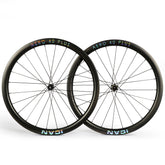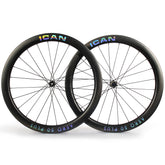Do I want 6 bolt or Centrelock brakes?
If you're thinking about new wheels, hubs or disc brakes, you may have come across the terms 6 bolt or center lock. These terms refer to the way your disc brake rotors attach to your bike's hubs. Which is better and what should I mount on my bike? This is a question that many new cyclists ask themselves.
When it comes to Centrelock or 6-bolt rotors, there is one important thing to consider first. Both Centrelock and 6-bolt hubs and rotors work with your disc brakes. It doesn't matter what brand or manufacturer your disc brakes are from. They work with both rotors.
The reason for this is that the terms 6 bolt or Centrelock refer to how you attach your rotor to your hub. As long as you have the rotor attached to the hub once and it is properly centered, you will see that your brakes don't care and will grab it and slow you down anyway.
What are 6-bolt disc rotors

Attaching 6-bolt rotors to your hub can be a fun process. They are very easy to solve. Always use a torque wrench and be careful when assembling. If you tighten them too much without damaging anything, they may fail while driving.
You also need to follow a star-shaped pattern when tightening the screws. If you don't follow this pattern, you will find that you most likely have your rotor mounted off-center. You will then end up with a ride full of skiffing and annoying noises unless you have your Torx wrench with you.
You should also regularly check the torque of your screws. The screws may be shaken or loosened while driving. When one screw remains tight and the opposite one becomes loose. Your rotor gets off center and starts rubbing against the brake pads.
However, it's not all bad. 6-bolt rotors are typically lighter than centerlock rotors, and you should find them much easier when you need a new one. You should also always be able to see the size and not just the style you need.
Advantages and disadvantages of 6-bolt disc rotors
|
Advantages |
Disadvantages |
|
Multiple rotor options |
Easy stripping during assembly |
|
Cheaper than Centerlock |
May fail while driving |
|
Rotors are readily available |
You may accidentally place them off-center |
|
|
Easier to deform |
What are Centerlock disc rotors?

One of the disadvantages of centerlock rotors is that they are a little heavier than 6-bolt rotors. The reason for this is that centerlock rotors consist of two parts. The outer steel part that has the braking effect is connected to an aluminum part that is attached to the hub.
The inner aluminum part has a series of small serrations in the middle. These gears are aligned with other gears on the hub body, and so they are connected to each other. It's a similar idea to how your cassette and freewheel fit together. This system makes installing Centrelock easier compared to 6 screw rotors.
The good news is that this two-part system makes bending your disc rotors much more difficult, almost impossible. Good news if you regularly bend windows. You'll find that the aluminum dissipates heat very well, which helps keep everything running nice and smoothly.
The best thing about centerlock rotors, however, is that once installed, they are centered and stay centered. You will never have problems with skiffing again. Not only are they easier to center, but they are also easier to remove. With the right tools, it only takes a few seconds to tighten or loosen your centerlock rotors.
Advantages and disadvantages of centerlock disc rotors
|
Advantages |
Disadvantages |
|
Easy to center |
Less choice of hubs |
|
Rotors are harder to bend |
Heavier rotor |
|
Easier to remove |
Requires a special Centrelock tool |
When should I choose Centerlock rotors?
One of the benefits of Centerlock that hasn't been mentioned yet is that Shimano makes Ice Tech Freeza rotors. These rotors are exactly what you need on hot days with a lot of descending.

This drop in temperature ensures constant braking performance. You will never again feel the loss caused by sustained braking on the most technical descents. It's great to know that you have consistent performance when applying the brakes.
So if you like skiing technical descents I would try Centerlock and see how your brakes perform.
Why should I choose 6-bolt rotors?
6-bolt rotors are ideal if you already have hubs with a 6-bolt pattern and don't want to change wheels. If you are brand loyal to SRAM, you most likely won't want to switch to Centerlock as Shimano has patented Centerlock so you will never see a SRAM Centerlock rotor.
If you are a weight fanatic, you will also prefer 6 screws. The lightest rotors you can buy have 6 screws, and they more than make up for the weight of the rotor screws. So if you're aiming for a hillclimb TT or KOM, you'll prefer the marginal benefits of lighter brakes.





